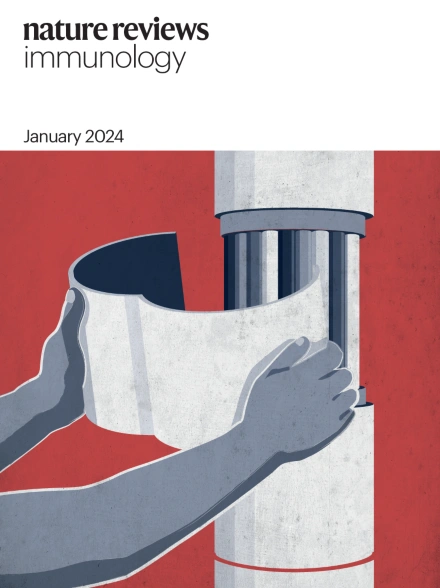Microenvironmental regulation of solid tumour resistance to CAR T cell therapy.
IF 60.9
1区 医学
Q1 IMMUNOLOGY
引用次数: 0
Abstract
Chimeric antigen receptor (CAR) T cell therapy holds significant promise for the treatment of cancer; however, its efficacy in solid tumours is substantially hindered by the immunosuppressive tumour microenvironment (TME). Solid tumours can resist immunotherapy by impairing T cell trafficking, function and persistence. One of the initial obstacles that CAR T cells encounter is the abnormal tumour vasculature, which restricts efficient T cell infiltration, further compounded by a dense extracellular matrix. CAR T cells that do infiltrate the tumours are outnumbered by immunosuppressive cells such as regulatory T cells, myeloid-derived suppressor cells and tumour-associated macrophages. Additionally, tumour cells can contribute to CAR T cell resistance by upregulating immune checkpoint molecules, such as PDL1 and CTLA4, and engage in metabolic competition. In this Review, we discuss how cellular and non-cellular components of the TME impair CAR T cell therapy and consider potential strategies to improve CAR T cell therapies for solid tumours, either by reprogramming the TME or by engineering CAR T cells to resist the immunosuppressive effects of the TME.实体肿瘤对CAR - T细胞疗法耐药的微环境调控。
嵌合抗原受体(CAR) T细胞疗法在治疗癌症方面具有重大前景;然而,其在实体肿瘤中的疗效受到免疫抑制肿瘤微环境(TME)的极大阻碍。实体肿瘤可以通过损害T细胞运输、功能和持久性来抵抗免疫治疗。CAR - T细胞最初遇到的障碍之一是异常的肿瘤血管系统,这限制了T细胞的有效浸润,而密集的细胞外基质进一步加剧了这一障碍。浸润肿瘤的CAR - T细胞数量不及免疫抑制细胞,如调节性T细胞、髓源性抑制细胞和肿瘤相关巨噬细胞。此外,肿瘤细胞可以通过上调免疫检查点分子(如PDL1和CTLA4)以及参与代谢竞争来促进CAR - T细胞抵抗。在这篇综述中,我们讨论了TME的细胞和非细胞成分是如何损害CAR - T细胞治疗的,并考虑了通过重新编程TME或通过改造CAR - T细胞来抵抗TME的免疫抑制作用来改善实体肿瘤CAR - T细胞治疗的潜在策略。
本文章由计算机程序翻译,如有差异,请以英文原文为准。
求助全文
约1分钟内获得全文
求助全文
来源期刊

Nature Reviews Immunology
医学-免疫学
CiteScore
93.40
自引率
0.40%
发文量
131
审稿时长
6-12 weeks
期刊介绍:
Nature Reviews Immunology is a journal that provides comprehensive coverage of all areas of immunology, including fundamental mechanisms and applied aspects. It has two international standard serial numbers (ISSN): 1474-1733 for print and 1474-1741 for online. In addition to review articles, the journal also features recent developments and new primary papers in the field, as well as reflections on influential people, papers, and events in the development of immunology. The subjects covered by Nature Reviews Immunology include allergy and asthma, autoimmunity, antigen processing and presentation, apoptosis and cell death, chemokines and chemokine receptors, cytokines and cytokine receptors, development and function of cells of the immune system, haematopoiesis, infection and immunity, immunotherapy, innate immunity, mucosal immunology and the microbiota, regulation of the immune response, signalling in the immune system, transplantation, tumour immunology and immunotherapy, and vaccine development.
 求助内容:
求助内容: 应助结果提醒方式:
应助结果提醒方式:


